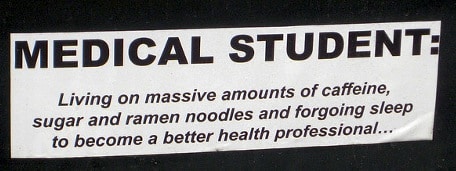
Two years ago, the American Medical Association reported that, although 25 hours of nutritional education are recommended for medical schools in the United States, only 27% of them actually offer that many. (The average is 19.6 hours, and most of the content concerns biochemistry, rather than practical food choices in everyday life.)
Some experts object because examinees for internal medicine certification are not asked a single question about nutrition. Cardiology as a specialty is no better, which is a shame because diet probably influences heart health. Some experts see this as an “educational void” and believe that better education in this area for medical professionals is key to the goal of changing trends on a societal scale.
Researchers who polled brand-new medical students discovered that:
71 percent think nutrition is clinically important. Upon graduation, however, fewer than half believe that nutrition is clinically relevant. Once in practice, fewer than 14 percent of physicians believe they were adequately trained in nutritional counselling.
There is a new trend toward involving medical students in actual kitchen-level food preparation involvement, and investigating local food availability conditions, so forth, which is all to the good.
These suggestions were made by the authors of the same Academic Medicine report. First, the students should take courses in nutrition, exercise, stress management, and sleep hygiene — all of which they will need for their own self-care, as well as to benefit their patients. Exams that lead to special certifications are proposed.
Different institutions come up with different ideas. The Tulane University School of Medicine, for instance, offers “clinical rotation at a professional cooking school.” One suggestion carries extra weight, in light of the bad publicity hospitals have endured because of unpopular affiliations with fast-food empires:
Create “hospitals and ambulatory care venues with exceptional cafeterias, restaurants, teaching kitchens, and inpatient menus showcasing foods that are healthy, delicious, affordable and easy to make,” the authors said, noting that nutritious foods should replace their processed predecessors in hospital eateries.
Because doctors are such highly-regarded authority figures, one last recommendation is very important, and that is to lead by modeling the desired behavior. In the anti-smoking movement, many physicians and other health professionals realized the importance of setting a good example. The fact that they quit smoking served as a catalyst for at least some patients, which can also be effective in the area of weight management.
Dr. Dyan Hes wrote:
Great strides are being made in the United States to try to educate physicians about preventive medicine — to talk your patients and their families about healthy nutrition at each visit in order to prevent them from becoming obese.
Your responses and feedback are welcome!
Source: “What’s at stake in nutrition education during med school,” AMA-Assn.org, 07/23/2015
Source: “8 ways med schools can take nutrition from classroom to kitchen,” AMA-Assn.org, 08/06/15
Source: “What I Wish Everyone Knew About Childhood Obesity: A Pediatrician Explains,” MindBodyGreen.com, 03/24/14
Photo credit: sylvar via Visualhunt/CC BY

 FAQs and Media Requests:
FAQs and Media Requests: 











